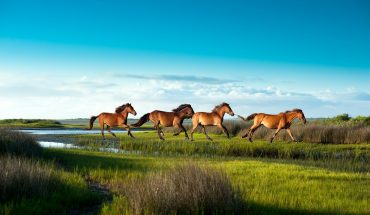photographs by Shawn Rocco
I have a neighbor who sport-fishes all over the world. Hawaii, Costa Rica, the Atlantic Gulf Stream. Marlin, tuna, sailfish. I told him I was writing a piece on a guy here in Raleigh who is an aficionado of another kind: Huck Finn-style cane poles. Bass, perch and crappie.
He shot me a look. “Those guys are serious.”
Turns out, Billy Williams is not only one of those guys, he’s the guy. Also turns out, he’s not an aficionado at all, but something more authentic, more rare. He is cane pole fisherman, natural born.
If you’ve been to Boondini’s, the sandwich shop on Six Forks Road that Williams has owned and worked in for 26 years, you’ve seen the pictures: Falls Lake, Lake Jordan, Shearon Harris, Neuse River, Haw River, ponds, creeks and backwaters with no names at all. Lots and lots of fish.
Not only does Williams fish with a clutch of 11- to 14-foot, single piece, cured and varnished cane poles without a speck of metal on them, he buys them as “blanks” – naked cane – and meticulously rigs them with a configuration of line and knots that is both simple and surgically exact.
“Don’t call it bamboo” were the first four words he said to me, peering over his glasses. I asked Williams if he knew of anyone else in the area who takes cane pole fishing as seriously as he does. He considered the question briefly.
“No,” he said.
Williams is a man who does not waste time. You might not expect this from someone who spends a considerable amount of it in a two-man boat fishing with a bamboo, er, cane pole. But it is precisely this passion that has him thinking two beats ahead.
After all, there are fish out there. And equipped with his cane poles, 25-horsepower outboard, sonar fish finder and a few decades of working local shorelines, Williams doesn’t waste a moment finding them.
Which isn’t to say that he doesn’t appreciate what so many of us do about the sport. After all, fishing on an Indian summer day with a Wal-Mart pole, hook, bobber and a morning’s supply of worms can be one of the most languorous and satisfying wastes of time one could hope to enjoy. It is, y’all.
But Williams will tell you there’s a right way and a wrong way to do it, and that there’s nothing more pulse-quickening than the pull of a Carolina panfish on the far end of a cane pole.
“It’s the action,” said Williams, his eyes intent. “You can catch big fish on a cane pole because the spring and constant tension wears the fish out – and you feel everything.”
Talk like that will drive a man to a general merchandiser like McLambs LP Gas & Supply in Benson. They’ve sold hardware and cane poles since 1940. Fact is, single piece cane poles are hard as heck to find.
“It’s a vanishing art,” said Bill Gregory, who ran a flyfishing shop near Boondini’s and has fished with Williams on occasion. Much like Williams – same genus, different species – Gregory sees the world through a fishy lens. He has fished some of the most legendary, trophy-rich freshwater in North America.
“I know some hard-core anglers,” said Gregory, “but I never saw a single one who had the look, the appreciation, that Billy does when he tells you about a spot he found on Falls Lake where a tree has fallen – he knows that lake like one of his children.”
Gregory mused about fishing with his own son, now barely three. “It will be with a cane pole like Billy’s,” he said.
The pictures in Boondini’s tell a story of a life on the water. And here in the Neuse River basin, water is everywhere. There are 123 fishing lakes and ponds listed in Wake County, by far the most of any county in the state. And those are just the ones with names. There are hundreds more farm and woodland ponds, mostly nameless, each one a keeper of memories, each holding the promise of hard-striking bass and bluegill.
Many of them are immortalized on Boondini’s walls. Williams knows every detail, and can remember every day he spent fishing on them, because each day was different. The water, the bite, the company. Even at 61, for Williams, it is never twice the same.
He could tell us about growing up in Williamston, and fishing the brackish water of the Cashie River with the cane pole his father gave him. Maybe he’d describe the Haw when it’s running low and clear, and how, when you’re pulling white bass out with abandon, you may see a bald eagle doing the same. Or the time at Falls Lake when he and a buddy hauled in 80 crappie. Eighty.
He would relate all this without sentiment.
A son and a daughter are grown, continued on page 91
the poles they used still in place in Williams’ garage. He probably has 20 or more. Some are beautifully aged. Others are young cane, acquired from a source in Johnston County by way of Mississippi, newly fitted with 6-pound line the same way his daddy did it, anchored with a clinch knot two feet from the tip, run up to the last node and tied off with a nail knot, the bobbers, shot and hooks set at various depths. A 16-foot aluminum boat, rigged to the teeth, stands at the ready.









